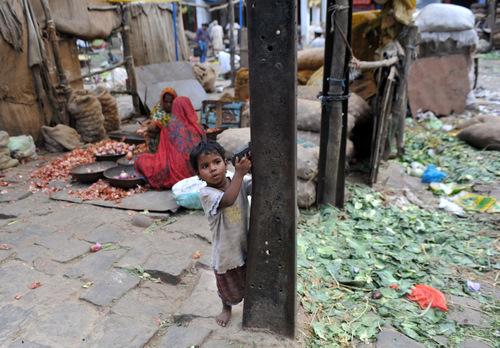India clears food subsidy bill
India’s cabinet on Sunday cleared a Food Security Bill, which seeks to provide subsidised food to 62.5% of the population.
Prime Minister Manmohan Singh's cabinet on Sunday approved a landmark Food Security Bill intended to provide food subsidies to two-thirds of the population.
The food bill seeks to provide rice at Rs 3, wheat at Rs 2 and coarse grains at Rs 1 per kg, the paper said.
But as the Economic Times reports, the debate continues as to whether increasing the scope of the welfare program will be good for the country, due to the long standing problem of leakages in the government distribution system, deficit problems and a possible negative impact on the pricing system for agricultural commodities.
Here's economist Bibek Debroy:
One part of it is bad news because of the fiscal mess that we are already in. And there is no way we can finance this. at the least, the incremental burden will be of the order of 35000 crores ( $7 billion) but I suspect that is a bit of an underestimate, we are talking more like about 50,000 crores ($10 billion). More importantly however than this is that it is completely going to distort the agro markets.
Here's Ashok Gulati, Chairman, Commission for Agricultural Costs and Prices:
Why are we burdening the system with excessive physical handling of the grain? Why can't we use some other instruments like conditional cash transfers so that poor people have an option to buy not only just rice and wheat but many other food products? It is going to cost more than 100,000 crores ($20 billion). The exact figure, that is being contemplated is about 113,000 crores ($22.6 billion). But the procurement prices, the minimum support prices of wheat and rice are likely to keep on increasing because the cost of production is increasing in the country.
Here's Jim Walker, Founder and MD, Asianomics
The food security bill in itself probably would make the fiscal situation deteriorate, but it is just one additional entitlement programme, one additional increase in expenditure. We are going into a phase where economic growth in India is probably only going to be about 5% to 6% through fiscal year 2013 given the slowdown in investment.
So far, though, unlike foreign direct investment in retail, the food bill has moved through the approval process without creating much stir where it counts — the parliament. Looks like socialist India is still alive and kicking.
Every day, reporters and producers at The World are hard at work bringing you human-centered news from across the globe. But we can’t do it without you. We need your support to ensure we can continue this work for another year.
Make a gift today, and you’ll help us unlock a matching gift of $67,000!
